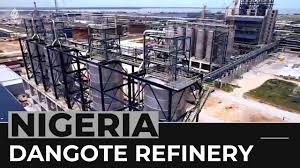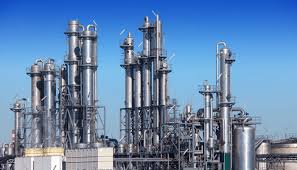![]()
If you’ve landed on this article page, you’re probably searching for a
good business idea—an idea that’s light on the pocket but heavy on
returns, promising both a fulfilling journey and potential profit.
|
How To Start A Lucrative Crude Oil Refinery Business in Nigeria
A crude oil refinery, also known as a petroleum refinery, is an
industrial process plant that transforms crude oil into a range
of useful products such as gasoline, diesel, jet fuel, and other
petrochemicals. It involves various physical and chemical
processes such as distillation, cracking, and reforming.
Crude oil refining is a crucial industry for Nigeria and Africa
as a whole. The continent is rich in crude oil reserves, but its
refining capacity is still relatively low. According to the OPEC
Annual Statistical Bulletin, Africa’s crude oil production in
2020 was approximately 8.1 million barrels per day (bpd), with
Nigeria accounting for about 1.3 million bpd. In Nigeria, the
oil and gas industry is the mainstay of the economy, accounting
for approximately 90% of the country’s total exports and over
70% of the government’s revenue.
The maturity period of a crude oil refinery business depends on
various factors such as the size of the refinery, location, and
capital investment. It could take up to three to four years
before the refinery begins to generate revenue. In terms of
production yield, the yield depends on the type of crude oil
being refined and the refining process used.
Business Opportunities In The Crude Oil Refinery Business In
Nigeria are
Refinery Construction: The construction of new refineries or the
expansion of existing ones provides opportunities for
engineering, procurement, and construction (EPC) companies.
Equipment and Machinery Supply: The supply of equipment and
machinery, such as pumps, compressors, valves, and turbines, to
refineries is an important opportunity for manufacturers.
Refinery Maintenance and Repair: The maintenance and repair of
refinery equipment and machinery, such as boilers, heat
exchangers, and furnaces, is a major opportunity for service
providers.
Pipeline Construction: The construction of pipelines to
transport crude oil and refined products is an important
opportunity for engineering and construction companies.
Storage and Terminal Operations: The operation of storage tanks
and terminals for crude oil and refined products provides
opportunities for logistics and transportation companies.
Fuel Retailing: The retail sale of gasoline, diesel, and other
refined products provides opportunities for entrepreneurs to
establish fuel stations.
Petrochemical Production: The production of petrochemicals, such
as plastics, solvents, and synthetic fibers, from refinery
byproducts is a major opportunity for chemical companies.
Lubricant Production: The production of lubricants, such as
engine oils and greases, from refinery byproducts is an
opportunity for specialty chemical companies.
Asphalt Production: The production of asphalt for road
construction from residual oil is an opportunity for
construction material suppliers.
Carbon Black Production: The production of carbon black, a
filler material used in rubber and plastic products, from
residual oil is an opportunity for specialty chemical companies.
Wax Production: The production of wax from residual oil is an
opportunity for specialty chemical companies.
Power Generation: The generation of electricity from refinery
byproducts, such as steam and waste gases, provides
opportunities for power plant developers.
Research and Development: The development of new refining
technologies, such as improved catalysts and process controls,
is an opportunity for technology providers.
Environmental Compliance: The monitoring and management of
refinery emissions and waste streams is an opportunity for
environmental consulting firms.
Training and Education: The training and education of refinery
workers in safety, process control, and maintenance provides
opportunities for training and education providers.
Crude oil refinery businesses in Nigeria and Africa can be
categorized into different types based on their refining
capacities and the types of crude oil they process. Some of the
common types are:
Mini Refineries: These are small-scale refineries with limited
capacities of up to 10,000 barrels per day. They are usually
established to cater to the needs of a specific region or local
market.
Modular Refineries: These are prefabricated refineries that can
be easily transported and assembled on-site. They have
capacities ranging from 1,000 to 30,000 barrels per day.
Standard Refineries: These are large-scale refineries with
capacities of up to 500,000 barrels per day. They are complex
facilities with various units for different refining processes.
Hydro-skimming Refineries: These are simple refineries that
process only light crude oils. They have limited capacities and
can refine up to 100,000 barrels per day.
Conversion Refineries: These refineries process heavy crude oils
and have the ability to convert them into lighter, more valuable
products like gasoline and diesel fuel.
Deep Conversion Refineries: These are highly specialized
refineries that can process heavy crude oils into a wide range
of products including gasoline, diesel fuel, and other
petrochemicals.
Each type of refinery has its own advantages and disadvantages
and may be suited for different market needs. Understanding the
different types of refineries can help investors make informed
decisions about their business plans.
Each method of crude oil refining has its own advantages and
disadvantages, and the choice of method depends on factors such
as the type of crude oil being refined and the desired end
products. It is important for companies involved in Crude Oil
Refinery Business in Nigeria
to choose the most appropriate refining method to ensure
the production of high-quality petroleum products that meet
market demand.
Types Of Crude Oil In Nigeria and Africa
Crude oil used for the refinery business in Nigeria and Africa
can vary based on several factors, including location and
availability. Some of the common types of crude oil used for the
refinery business in Nigeria and Africa are:
Bonny Light Crude Oil: This is a light crude oil that is low in
sulfur content and is considered to be of high quality. It is
produced in Nigeria and is exported to various countries around
the world.
Forcados Crude Oil: This is a medium-grade crude oil that is
also produced in Nigeria. It has a higher sulfur content than
Bonny Light and is typically less expensive.
Brent Crude Oil: This is another light crude oil that is
commonly used for refining in Nigeria and Africa. It is produced
in the North Sea and is known for its low sulfur content.
Arab Light Crude Oil: This is a type of crude oil that is
produced in Saudi Arabia and is often used for refining in
Africa and other parts of the world. It is known for its
high-quality properties.
Basra Light Crude Oil: This is another type of crude oil that is
produced in Iraq and is commonly used for refining. It is known
for its low sulfur content.
WTI Crude: This is a high-quality crude oil that is produced in
the United States.
The type of crude oil used for refining can have a significant
impact on the quality of the final product, as well as the cost
and efficiency of the refining process.
The peak production, supply, and demand season for the Crude Oil
Refinery Business in Nigeria and Africa depends on various
factors, including global crude oil prices, demand for refined
products, and geopolitical events. In general, the demand for
refined products such as gasoline, diesel, and jet fuel tends to
increase during the summer months due to increased travel and
transportation activities. However, this can vary based on
regional factors such as weather patterns and economic
conditions.
Refining and packaging crude oil is an essential process in the
crude oil refinery business. Here are the step-by-step guide on
how to refine and package crude oil in Nigeria and Africa:
Separation of crude oil: The first step in refining crude oil is
to separate it into different components such as gasoline,
diesel, kerosene, etc. This is done by heating the crude oil and
allowing it to vaporize, then condensing the vapors at different
temperatures.
Distillation: The separated components are then further refined
through distillation, which involves heating the crude oil to
its boiling point and then cooling the vapors to collect the
desired component.
Desulfurization: Crude oil is treated to remove sulfur and other
impurities to meet the required specifications for fuel.
Catalytic cracking: This process is used to break down large
hydrocarbon molecules into smaller ones, which are more useful
as fuel.
Polymerization: This process involves combining smaller
hydrocarbon molecules to form larger molecules, which are useful
as lubricants and other specialty products.
Packaging: The refined products are then packaged in containers
such as drums, tanks, or barrels for transportation to
distributors and end-users.
Quality control: The final step in the refining process is
quality control, which involves testing the refined products to
ensure they meet the required specifications.
It is important to note that the refining process may vary
depending on the type of crude oil and the desired end product.
Also, safety measures should be taken seriously during the
refining process to prevent accidents and ensure a safe working
environment.
Here are some of the equipment used in a Crude Oil Refinery
Business in Nigeria :
Distillation Unit: It is used to separate different components
of crude oil by heating and vaporizing them at different
temperatures.
Fractionating Column: It is used to separate the various
fractions of crude oil obtained during distillation.
Heat Exchangers: These are used to transfer heat between
different fluids or gases and are critical in maintaining the
temperature necessary for refining.
Reactors: These are vessels where chemical reactions occur
during refining.
Separators: These are used to separate various components from
crude oil, including gas, oil, and water.
Desalter: It is used to remove salt and other impurities from
crude oil.
Pumps: They are used to transport crude oil from one part of the
refinery to another.
Storage Tanks: These are used to store crude oil and the various
fractions obtained during refining.
Pressure Vessels: These are used to store and transport gases at
high pressure.
Boilers: They are used to generate steam necessary for heating
the crude oil during refining.
These are just a few of the equipment used in a Crude Oil
Refinery Business in Nigeria and Africa, and the specific
equipment needed will depend on the scale and type of the
refinery.
Target Market For The Crude Oil Refinery Business In Nigeria
Domestic Industries: Refinery products such as diesel, gasoline,
and kerosene are widely used by domestic industries for
transportation and power generation.
International Markets: Nigeria and Africa have a large export
market for refined petroleum products, particularly gasoline and
diesel, which are in high demand in other African countries.
Government Agencies: The government of Nigeria and other African
countries are major customers of the crude oil refinery business
for their energy needs, military requirements, and
transportation.
Aviation Industry: The aviation industry in Nigeria and Africa
depends heavily on aviation fuel, which is produced by the crude
oil refinery business.
Transportation Industry: The transportation industry is a
significant consumer of refined products, including diesel,
gasoline, and kerosene.
Agriculture Industry: The agriculture industry in Nigeria and
Africa relies heavily on petroleum products for tractors,
trucks, and other farm machinery.
Power Generation Companies: Power generation companies are
important customers of the crude oil refinery business for their
fuel needs.
Mining Industry: The mining industry requires large quantities
of diesel and gasoline for its operations.
Construction Industry: The construction industry uses diesel and
gasoline for its equipment and vehicles.
Marine Industry: The marine industry requires diesel and
lubricants for its vessels.
Chemical Industry: The chemical industry requires petroleum
products as a raw material for producing various chemicals.
Plastic Industry: The plastic industry requires petroleum
products such as ethylene and propylene for producing plastic.
Pharmaceutical Industry: The pharmaceutical industry requires
petroleum products as a raw material for producing various
medicines.
Cosmetic Industry: The cosmetic industry requires petroleum
products such as paraffin wax and mineral oil for producing
various products.
Food Industry: The food industry requires petroleum products
such as lubricants and packaging materials for producing and
packaging food products.
The crude oil refinery business is a lucrative venture in
Nigeria , due to the abundance of crude oil in the region. The
business offers numerous benefits to both the economy and the
investors, including job creation, revenue generation, and
increased industrialization. However, there are several
challenges associated with the business, including government
policies, funding, and market volatility. Therefore, it is
essential to conduct thorough research, obtain the necessary
permits and licenses, and develop a comprehensive business plan
before venturing into the business.
Get our guide on how to start a profitable Crude Oil Refinery
Business in Nigeria.
The body of this work is formed from consulting experienced and
relevant people running the Crude Oil Refinery Business, to get
first-hand information about the success secrets and marketing
strategies deployed to achieve business success
|







